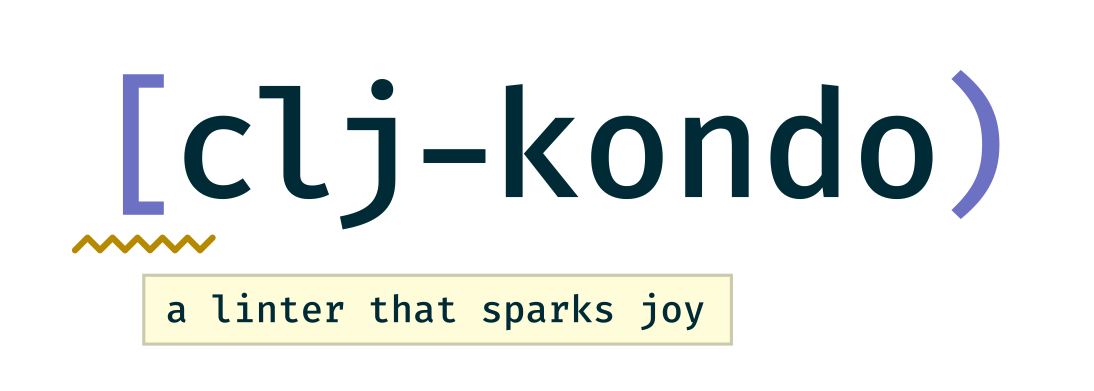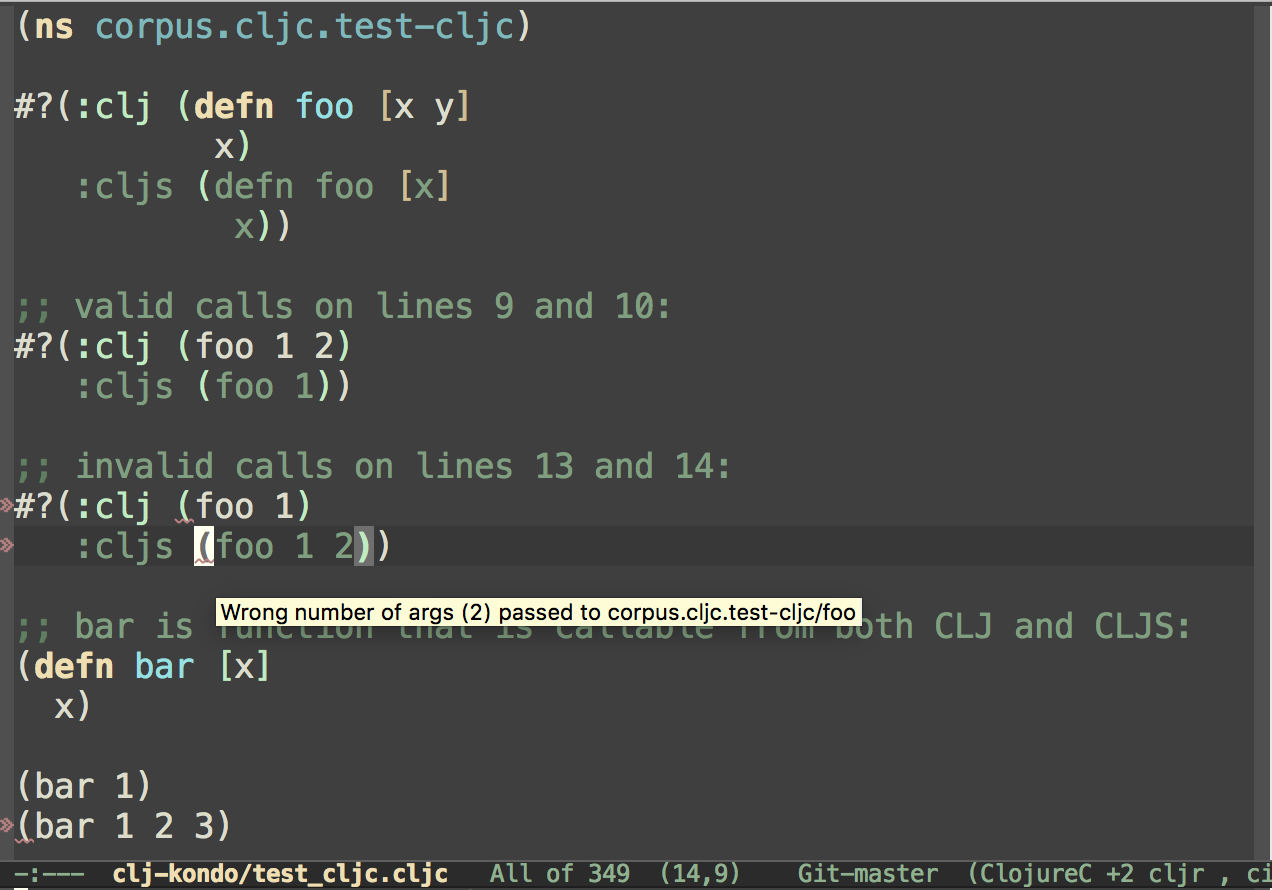A static analyzer linter and for Clojure code that sparks joy.
Thanks a lot for clj-kondo. It is like a companion for me. It has made clojure fun again.
— @geraldodev on Clojurians Slack
Clj-kondo performs static analysis on Clojure, ClojureScript and EDN, without the need of a running REPL. It informs you about potential errors while you are typing.
Clj-kondo detects:
- inline
defexpressions - redundant
doandletwrappings - arity errors:
- within the same namespace and across namespaces
- of static Java method calls
- of local
letandletfnbinding calls - of recursive calls (including
recur) - conflicting arities in overloaded functions
- unused private vars
- private and deprecated var usage
- required but unused namespaces
- unsorted required namespaces
- referred but unused vars
- duplicate requires
- unused function arguments and let bindings
- marked as unused, but used arguments and let bindings (optional)
- unused imports
- redefined vars
- unresolved symbols, vars and namespaces
- misplaced docstrings
- duplicate map keys and set elements
- duplicates and quoting in case test constants
- missing map keys
- invalid number of forms in binding vectors
- missing assertions in
clojure.test/deftest - alias consistency
- type checking
- Datalog syntax checking
- format string argument mismatches
- shadowed vars
- 2 argument usage of reduce (optional)
before your form hits the REPL.
It suggests several style guide recommendations, such as:
- rules from Stuart Sierra's how to ns
- use
:elseas the catch-all test expression incond(see Clojure style guide) - use
seqinstead of(not (empty? ,,,))(see Clojure style guide)
It has support for syntax of commonly used macros like
clojure.core.async/alt!!, schema.core/defn and potemkin/import-vars.
It detects common errors in deps.edn and bb.edn
It provides analysis data so you build your own custom linters.
View all available linters here.
This linter is:
- compatible with
.clj,.cljs,.cljcand.ednfiles - build tool and editor agnostic
- a static code analyzer
- compiled to native code using GraalVM
Try clj-kondo at the interactive playground.
Watch the talk:
Lint from stdin:
$ echo '(def x (def x 1))' | clj-kondo --lint -
<stdin>:1:8: warning: inline defLint a file:
$ echo '(def x (def x 1))' > /tmp/foo.clj
$ clj-kondo --lint /tmp/foo.clj
/tmp/foo.clj:1:8: warning: inline defLint a directory:
$ clj-kondo --lint src
src/clj_kondo/test.cljs:7:1: warning: redundant do
src/clj_kondo/calls.clj:291:3: error: Wrong number of args (1) passed to clj-kondo.calls/analyze-callsLint a project classpath:
$ clj-kondo --lint "$(lein classpath)"To detect lint errors across namespaces in your project, a cache is needed. To
let clj-kondo know where to create one, make a .clj-kondo directory in the
root of your project, meaning on the same level as your project.clj,
deps.edn or build.boot. A cache will be created inside of it when you run
clj-kondo. Before linting inside your editor, it is recommended to lint the
entire classpath to teach clj-kondo about all the libraries you are using,
including Clojure and/or ClojureScript itself:
$ clj-kondo --lint "<classpath>" --dependencies --parallel --copy-configsThe --dependencies flag indicates that clj-kondo is used to analyze sources to
populate the cache. When enabled, clj-kondo will suppress warnings and skips over
already linted .jar files for performance.
The --parallel option will use multiple threads to lint your sources, going through them faster.
The --copy-configs flag will search and copy configurations from dependencies into the
.clj-kondo directory, while linting (see
config.md).
Build tool specific ways to get a classpath:
lein classpathboot with-cp -w -f -clojure -Spath
So for lein the entire command would be:
$ clj-kondo --lint "$(lein classpath)" --dependencies --parallel --copy-configs
Now you are ready to lint single files using editor integration. A simulation of what happens when you edit a file in your editor:
$ echo '(select-keys)' | clj-kondo --lang cljs --lint -
<stdin>:1:1: error: Wrong number of args (0) passed to cljs.core/select-keysSince clj-kondo now knows about your version of ClojureScript via the cache,
it detects that the number of arguments you passed to select-keys is
invalid. Each time you edit a file, the cache is incrementally updated, so
clj-kondo is informed about new functions you just wrote.
If you want to use a different directory to read and write the cache, use the
--cache-dir option. To disable the cache even if you have a .clj-kondo
directory, use --cache false.
Exit codes can be controlled by the --fail-level <level> option. The
default fail level is warning which returns exit codes as follows:
0: no errors or warnings were found2: one or more warnings were found3: one or more errors were found
If --fail-level error is supplied, warnings do not lead to a non-zero exit code:
0: no errors were found0: one or more warnings were found3: one or more errors were found
All exit codes other than 0, 2 and 3 indicate an error because of a bug in
clj-kondo or some other unexpected error beyond the control of clj-kondo.
Companies using clj-kondo
Clj-kondo can be invoked as a babashka pod.
#!/usr/bin/env bb
(ns script
(:require [babashka.pods :as pods]))
(pods/load-pod "clj-kondo")
(require '[pod.borkdude.clj-kondo :as clj-kondo])
(clj-kondo/merge-configs
'{:linters {:unresolved-symbol {:exclude [(foo1.bar)]}}}
'{:linters {:unresolved-symbol {:exclude [(foo2.bar)]}}})
;;=> {:linters {:unresolved-symbol {:exclude [(foo1.bar) (foo2.bar)]}}}
(-> (clj-kondo/run! {:lint ["src"]})
:summary)
;;=> {:error 0, :warning 0, :info 0, :type :summary, :duration 779}- joker for inspiration
- rewrite-clj for the Clojure parser code
- eastwood for
var-info.ednand inspiration - contributors and other users posting issues with bug reports and ideas
- Nikita Prokopov for the logo
- adgoji for financial support
- Clojurists Together for sponsoring work on hooks
This project exists thanks to all the people who contribute. [Contribute].
Become a financial contributor and help us sustain our community. [Contribute]
Support this project with your organization. Your logo will show up here with a link to your website. [Contribute]
Copyright © 2019 Michiel Borkent
Distributed under the EPL License, same as Clojure. See LICENSE.
The directory inlined contains source from tools.reader which is licensed under the EPL license.
The directory parser contains modified source from rewrite-clj which is licensed under the MIT license.






